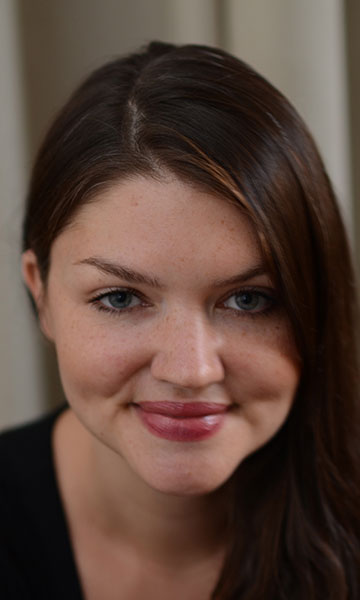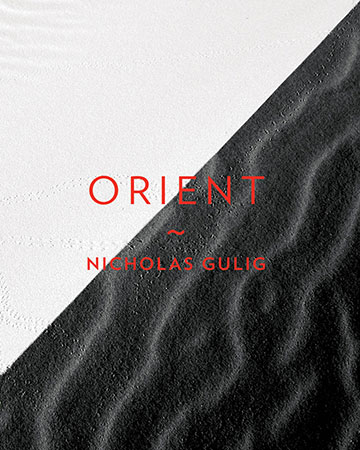Orient
Nicholas Gulig
Cleveland State University Poetry Center, 2018.
Paperback, 130 pages
Review by Marlie McGovern
Orient is an incantation, an immersion into a world made of sound, in which we experience the potential to forge vital connection and reclaim agency through the embodied act of listening. We first encounter an image of standing water in the desert, its murk and mirror signaling a crisis of diminished humanity, yet Gulig is quick to remind us of the capacity of living breath and the possibility of oasis. Orient flows, its pace and rhythm are that of an undulating river, a cursive song. Sound, water, and breath are each wave forms.
“The tiny bones inside the ear” and the “continuous expansion and contraction of the human lung,” situate us in the landscape of our own body, and in the physical landscapes and circumstances in which human bodies reside—often dangerous, commodified, and pornographic. Breath traverses the internal border between conscious and unconscious mind, and crosses the porous delineation of one’s own body into outside world. Like breath, sound enters our permeable bodies, and cacophonies move out from us. “The origin of utterance is breath,” writes Gulig, a powerful means of sharing mind, and yet so often we are violently cut off from the other breathing, hearing beings—reduced in personhood by our misperception of “the sound of I… given in to.”
Where, amongst this distress and distance, can we find the “the possibility of song”? Gulig is sensitive to the potency of interstitial, inter-subjective space, “a vital emptiness, the field between polarities.” He speaks powerfully of the violence of disconnection, and the potential of listening to construct “a bridge that binds a single space,” holding the tension of opposites. Western and Eastern psychology recognize liminal space as the locus of creativity, intimacy, and synthesis. Sound and breath occupy this space, as do speech and language. Listening, translating, and restructuring speech are means of reclaiming humanity:
“…If our speaking / changes, and we, ourselves, / are changing, making…”
Light, in wave form, “passes through an even vaster / space, a substance claimed in the Old Testament and the Qur’an as void or chaos, / both of which are nothing and predate the earth, its violent history and hold it,” and reminds us of the power of the language to bring order out of chaos, to prevent erasure. Throughout Orient, the limited, harmful, and redemptive aspects of language are measured and negotiated: alphabet, book, dialogue, script, scripture, and the weight of human thought with its limits, edges, and frontiers.
Gulig challenges us to examine our own complicity in atrocity, and to become “makers,” active advocates for the possibility of felt connection—to listen, to translate, and to speak up. Each of these acts necessarily occurs in intermediary, interpersonal space. Our sense gates serve as thresholds across which the outside world moves into our consciousness, and through which we act and interact within the world around us. Buddhist understanding of sense perception includes the familiar five sense gates: tongue and taste, eyes and sight, ears and sound, nose and smell, skin and touch, and extends to mind and thought.
The neuroplasticity of the human brain allows us to continuously develop, adapt, learn, and unlearn throughout our lifetimes. Despite this extraordinary potential, we can easily become limited in the scope and depth of our sensitivity and imagination, experiencing only a small portion of our vast mental capacity. Neural pathways in the brain that we use frequently grow strong and comfortably familiar, ingraining patterns of thinking and perception. We may be so close to our own habits, conceptions, and reactivity that we are not even aware of how many other ways of thinking, feeling, and being in the world are available to us. Before we name, sort, and conceptualize experiences with the evolutionarily newest part of our brains, the pre-frontal cortex, we meet experience directly, raw and fresh. It is here in the liminal space of not-knowing, between direct experience and concretized categorization, idea, or belief, where generative possibility lies, and where Orient’s new music can be heard.
To listen is to inhabit a liminal space — to vibrate in the synaptic hum between neural firings, and to traverse the intersubjective boundaries of self and other, of mind and world. Orient invites a pause in habitual perception, and offers us the opportunity to realize a new insight, to make an unexpected connection, to soften the constraints of rigid thinking, or reinvigorate imagination. Language, spoken and written, offers us a vital means of entering the potential and expansiveness of the in-between, enhancing our humanity and connection with the world around us. “The fate of others now depends on one’s ability to / be a maker, to create and then maintain a living faith in the vibrant, vital space of /overlap.” Here we are together on the cusp, “standing at the shore, its edges / breathing.”

Marlie McGovern is an author and teacher of meditative and somatic practices integrating the wisdom traditions of yoga and Buddhism with insights from contemplative psychotherapy and creative writing. She is an MFA candidate at Naropa University, where she is completing her first book on working with mind through the body.
